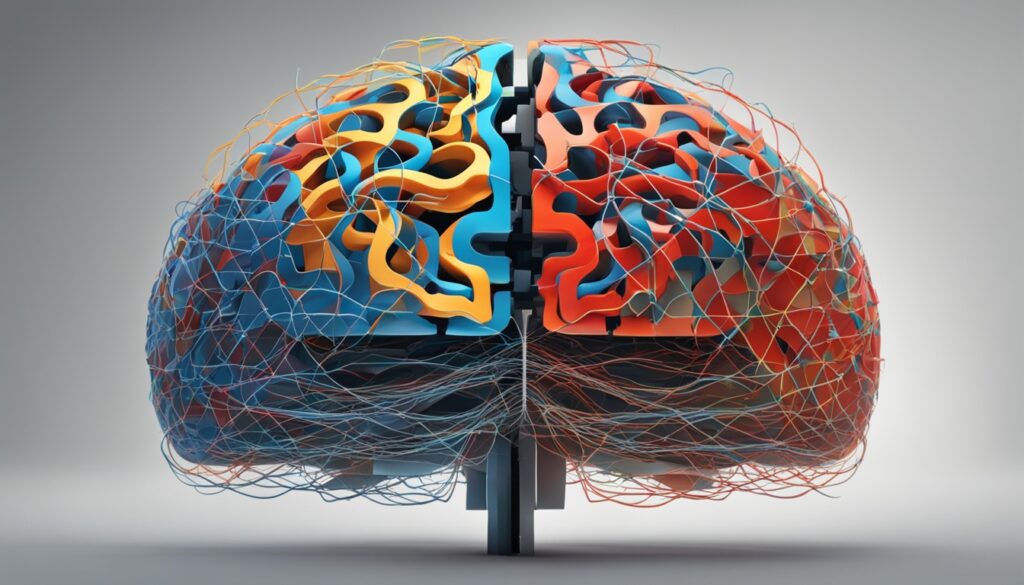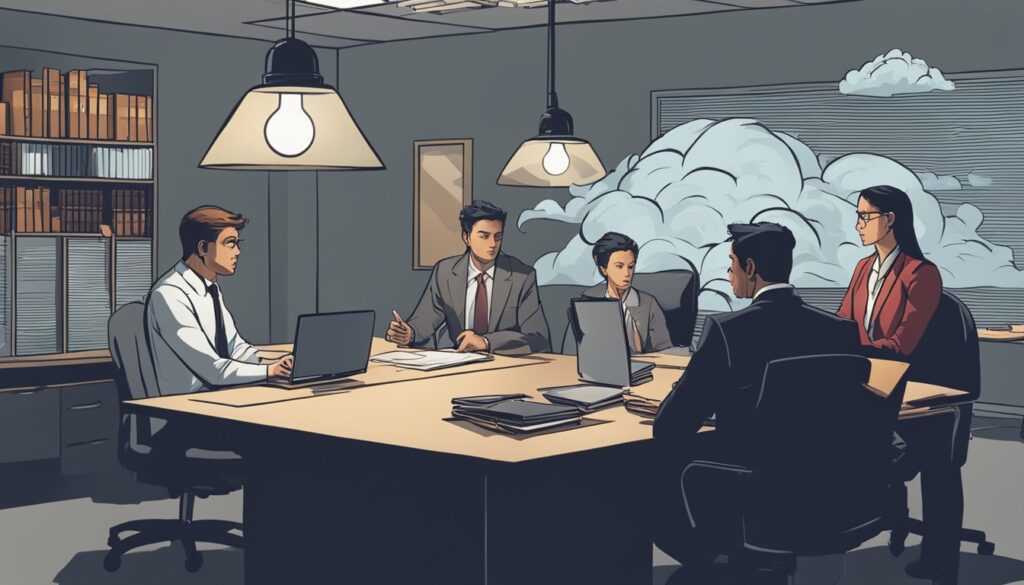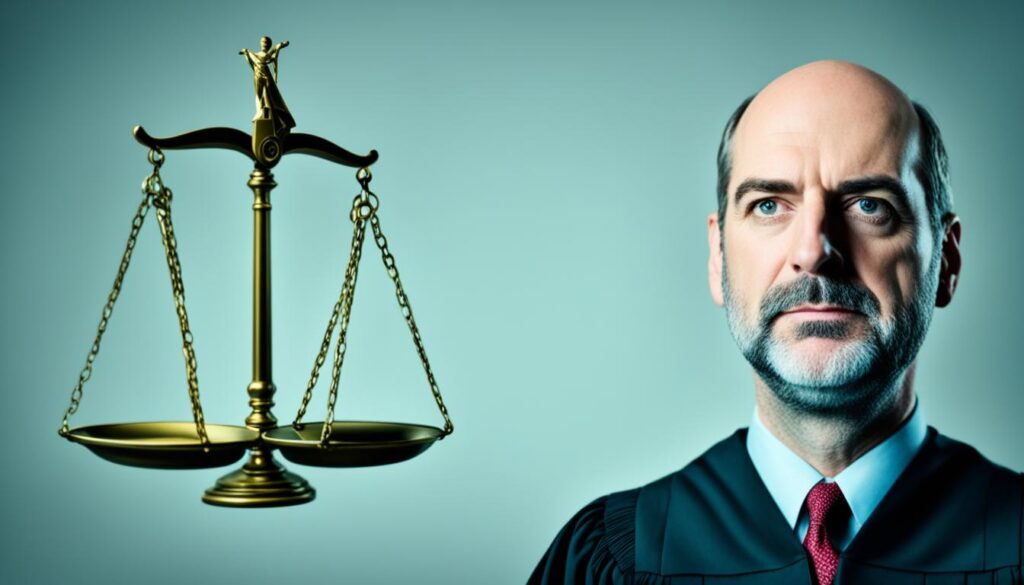Did you know there are over 175 cognitive biases? These flaws in our thinking greatly affect how we make choices. They influence everything from how we see information to our risk assessment and judgments. In simple terms, cognitive biases are a big part of our daily decisions1.
Let’s take the actor-observer bias as an example. In a 2007 study, people saw a near-accident as less risky when they imagined it from the driver’s view1.
Another bias, called the anchoring bias, skews our decisions based on the first info we get. This means our early impressions shape our later choices, often misleading us1.
Our attentional bias draws us to specific details as a survival skill. While it helps in some cases, it can be tough for those with anxiety1.
The availability heuristic makes us put more trust in easily recalled things. This can lead to unfair judgments, influencing our decisions1.
Confirmation bias is big in today’s world of social media. People look for info that agrees with them, waving off opposing views1.
The Dunning-Kruger effect tricks us into thinking we’re better than we really are. It can mess up our choices and sense of reality1.
People often think others believe what they do, thanks to the false consensus effect. It pushes us to think our opinions are more widely accepted than they are1.
Functional fixedness hampers our creativity and problem-solving. Getting past it means seeing things or issues in brand-new ways1.
The halo effect overvalues one trait, like beauty, in forming our whole opinion of someone. This can heavily sway our decisions and views1.
These examples are just the tip of the iceberg. Biases affect not only our choices but also how well we solve problems and get along with others. They can even shake up our memories, job success, how we react in crises, and various aspects of our lives. Knowing and admitting to these biases helps us make better decisions and think more critically.
Key Takeaways:
- Over 175 cognitive biases have been identified, affecting decision-making, problem-solving, and relationships.
- Cognitive biases can result from problems with memory, attention, attribution, and other mental errors.
- Awareness of cognitive biases is crucial for mitigating their impact on decision-making.
- Challenging and questioning our biases can help us become more critical thinkers.
- Cognitive biases can affect career success, memory reliability, crisis responses, and relationships.
What is Cognitive Bias?
Cognitive bias is a flaw in our reasoning that happens when we misunderstand information. This leads to wrong conclusions. Our brains create ways to quickly handle information based on our life experiences. But, these ways are not always accurate because of our personal filters2.
These biases make us focus on some info more than others. They also cause us to remember our past decisions wrongly. We often end up trusting certain sources without good reason. Our brains do this to simplify thinking and make fast choices2.
In 1972, Amos Tversky and Daniel Kahneman talked about cognitive bias. They showed how it affects our decision-making2.
Since then, researchers have found many cognitive biases. This has shown us just how flawed our thinking can be at times23.
Some known biases include the Actor-observer bias, Anchoring bias, and Confirmation bias. They also include the Dunning-Kruger effect. Each of these can change how we make decisions2.
These biases are not just part of our daily lives. They also show up in professional fields, such as software development and data analytics. Even in machine learning, these biases can have a big impact2.
In fact, in software and data work, cognitive biases can lead to mistakes. They can affect how well predictive models and learning systems work2.
Machine learning can also be affected by bias. This happens when the data is not good enough, or when the people developing it have their own biases. Types of machine learning bias include prejudice bias and sample bias2.
To lower bias in machine learning, organizations can do a few things. They can choose their training data carefully. They can also test their systems well. Tools like Google’s What-If Tool and IBM’s AI Fairness 360 can also help2.
Even with these efforts, completely removing bias is tough. But it’s really important to make sure that bias does not hurt the job a system is meant to do2.
Understanding Cognitive Bias
Cognitive biases happen because our brains try to simplify how we understand things. They can lead us to wrong conclusions and affect our judgments. This happens in personal and professional settings2.
Knowing about cognitive biases helps us make better choices. We can work towards being more objective in all aspects of our lives. This includes personal and work relationships23.
Common Types of Cognitive Bias
Researchers have found over 175 cognitive biases that can impact our decision-making. It’s key to know them so we see how they affect our thoughts and actions. Some widely known biases are:
Confirmation Bias4
Confirmation bias makes us prefer information that supports what we already believe. We often ignore or reject facts that don’t align with our views. This affects about 34% of us, changing how we understand information.
Anchoring Bias5
Anchoring bias happens when we rely too much on the first information we get. It can influence many parts of our lives, like how we negotiate and our health diagnoses.
The Availability Heuristic456,,
The availability heuristic is when we trust examples or info that quickly comes to mind. About 57% of us fall into this bias, often thinking recent events are more likely to happen again. It can also make us notice something new and then see it everywhere, known as the Baader-Meinhof phenomenon.
Loss Aversion46,
Loss aversion means we hate losing more than we love winning. This isn’t just a human thing, animals like monkeys show this too. It influences 39% of people, affecting their choices to avoid losing something.
Actor-Observer Bias5
The actor-observer bias makes us explain our actions based on the situation but others’ actions by their personality. This can lead to misjudging ourselves and others.
These biases are common hurdles to clear thinking. Knowing about them helps us make better decisions. We can aim for more logical and informed choices by reducing how much these biases impact us.


How Cognitive Bias Affects Decision-Making
Cognitive biases greatly shape how we make decisions and solve problems. They are part of how our minds naturally work. These biases can lead us to choose certain paths in our careers, remember things differently, and even affect how we bond with others.
Our work lives can suffer because of these biases. They may cause us to unfairly judge others, show favoritism, or make errors in thinking. These mistakes can stop us from growing in our jobs and moving forward.
In remembering past events, biases can change our memory of what really happened. This is risky, especially in legal matters. A witness might remember wrongly because of these biases, which could lead to the wrong decision or judgment7.
Biases also play a big part in how we get along with others. They might make us misinterpret what someone is trying to say or make us unfairly judgmental. This affects how we talk with others and the strength of our relationships8.
Studies show that biases can limit our ability to think clearly and solve problems well. They stop us from being open to new ideas or different ways of thinking. So, our creative and innovative sides can be held back by these biases8.
It’s vital to know about biases and how they can influence our choices. If we learn to spot these biases and work against them, we can make better, smarter decisions. This can help us grow in both work and life9.


Can You Avoid Cognitive Bias?
Avoiding cognitive biases completely is tough because our brains are designed to process information in certain ways. Yet, there are steps we can follow to lessen their impact on our choices.
To start, learning about cognitive biases and how they affect our thoughts is key10. This knowledge makes us more alert. We can spot these biases when they show up.
Knowing when our biases will likely kick in can also make a big difference. This insight allows us to detect and fix them as they happen11. It’s essential to actively look for different views and question our own biases10.
These efforts help us decrease the power of cognitive biases on our choices. They boost our critical thinking and reasoning skills. Getting good at identifying and planning, delaying decision-making, practicing mindfulness meditation, and using probabilistic thinking can lead to better choices11.
Understanding and acting to reduce cognitive biases are vital for smarter and more balanced decisions. While quirks in our thinking may never vanish, the aim is to lower their effect. This way, we can make more fair choices1011.
The Impact of Cognitive Biases in Management
Cognitive biases greatly affect how leaders make choices. They influence how information is seen and judged.
For example, overconfidence can make managers believe too much in their skills. They might not see the full risks in choices12. This leads to wrong guesses and less open-minded decisions, which can end badly.
The outcome bias is another key factor. It makes managers measure a decision’s goodness just by its result12. They might not look at the steps taken or potential problems with the choice.
Choices by managers hugely impact many people and groups12. It’s key that they realize and fight these biases. They can do this by including others’ viewpoints, questioning old beliefs, using clear logic, and looking at solid data.
It’s also important to create an atmosphere where team members can openly speak up. This culture can help spot and fight off biases in choices12.
Getting to know customers better can also help see and stop biases. Studying how customers act and what they like can show where mistakes might be happening12.


The Influence of Cognitive Biases in Finance
Cognitive biases greatly affect how we make financial choices. Take the anchoring bias, for instance. It makes investors put too much weight on the first info they get13. They may focus only on a single or historical data when making decisions. This approach can lead to poor choices and limit their view of the situation.
The availability bias is another hurdle. It tricks investors into relying on what’s easy to get to, rather than looking at all options14. This choice-making flaw can narrow anyone’s understanding of the market. It keeps them from checking all important data for their investments.
These biases can push people to make bad investment calls, follow the crowd blindly, and create flaws in the market. It’s critical for finance experts to know and fight these biases. Doing your homework thoroughly can arm you against these biases, helping you choose wisely14. Getting advice from financial experts can also bring fresh, unbiased opinions. This advice can help you wade through financial choices with more wisdom14.


Knowing about and tackling these biases is key for smart financial moves. Spreading your investments wisely and sticking to smart strategies can lessen the blow of cognitive biases. Being aware and handling these biases can lead to clearer, smarter financial decisions.
The Impact of Cognitive Biases in Medicine
In medicine, how we think can sometimes cause big problems. This is most true when it comes to making a diagnosis. Doctors can fall into the trap of confirmation bias. This means they look for evidence that backs up what they originally thought, ignoring anything that doesn’t. Sadly, this can lead to wrong diagnoses, treatment delays, and bad outcomes for the patient. But it’s not just this bias that’s troublesome. Others, like the availability bias and anchoring bias, also mess with decision-making15.
The availability bias makes docs pay more attention to things that easily come to mind. They might focus on past cases they remember well, even if they’re missing key info. The anchoring bias is kind of similar. It makes doctors give more weight to the first pieces of info they get. This, too, can block them from considering other possible diagnoses16.
These biases can hurt patient care bad. Shockingly, about 6 to 17% of the hospital’s mistakes are linked to diagnostic errors17. And get this, 28% of these mistakes are because of how doctors think17. These mess-ups can mean wrong diagnoses, missed problems, and treatments that just don’t work. Things can even get as bad as leaving tools inside patients, surgeries on the wrong body part, and patients falling because of a diagnostic mistake17.
But there is hope. Teaching doctors about their thinking flaws can make a big difference. Courses that cover these biases and how to avoid them can help. Also, activities that make doctors think about their thinking, like self-reflection, can improve how they diagnose illnesses16. Encouraging doctors to always consider other possible diagnoses before jumping to conclusions is another strategy that works16.
So, it’s key that med students learn about cognitive biases right from the start. This way, reflexively noting and avoiding these thinking pitfalls can become second nature to doctors. And let’s not forget, using solid numbers and facts when deciding what’s best for the patient is highly advised15. This makes sure doctors are making choices based on good, solid information.
The Influence of Cognitive Biases in Law
The legal field is not free from the influence of cognitive biases. These biases affect a wide range of legal issues. This includes employment law, jury selection, and criminal defense18.
Confirmation bias is a big player in legal decisions. It makes judges and juries more likely to believe evidence that fits what they already think. This might skew the way they look at evidence and impact their decisions18.
Then, there’s the hindsight bias. This makes professionals think that things were more obvious once they’ve already happened. It can make them judge negligence and blame unfairly, affecting the results of legal cases18.
Tackling cognitive biases in law is critical for fairness. Methods like anonymous reviews, educating about biases, and careful decision-making can help. These methods aim to reduce the negative effects of biases in legal proceedings18.
It’s crucial to fight biases in various legal areas. For instance, in hiring, it’s important to use blind applications to stop discrimination. For jury picks, asking the right questions can screen out biased individuals. Blind reviews in bidding processes make things fairer. Also, lawyers should work against using unfair evidence in criminal cases19.
In business, mergers and contracts can be impacted by biases. Employing strategies to remove these biases can lead to better choices. Additionally, bankruptcy situations can become more fair through impartial procedures and careful decision-making19.
Judges are at risk of cognitive biases, too. Research shows how biases can affect their judgment, leading to unfair rulings. Even with training, judges can fall victim to biases like availability and hindsight bias, among others20.
To maintain public trust and fairness, judges are chosen for their skills and impartiality. They must be unbiased and focus on law and evidence. Preventing and managing cognitive biases is key to a just legal system20.


Research Gaps and Future Directions
Research on cognitive biases and decision-making has brought big insights. Yet, we still have open gaps to look into and more to explore.
Sometimes, studies that use stories (vignettes) to look at biases may not match real life. They help a lot but might miss the full picture of how we make decisions every day21.
We need to study why some people are more affected by biases than others. This can help us fully understand how biases shape our choices21.
To bridge these gaps, we need better ways to measure these biases. These methods should not just be about what people say. They should include things like physical signs or how people actually act21.
Also, it’s important to study decisions made in real life. This might mean using high-tech virtual reality or watching how biases play out over time21.
Looking at biases in fields like healthcare, finance, and law could also give us crucial insights. It helps pick out the most common biases in these areas. This way, we can find ways to lessen their effects2223.
Lastly, we should explore how personal traits and where we come from interact with biases. This deeper look helps build a better model of making decisions. It considers both what everyone shares and what makes each situation unique23.
Despite the huge steps forward, there’s still much we don’t know about biases. By focusing on personal differences, making better measuring tools, using real-life examples, and digging into certain fields, we can enhance our knowledge on the effects of biases. This will help find better ways to deal with biases’ influence.
Conclusion
Cognitive biases greatly affect our choices in many fields like management and medicine. They often lead to mistakes in our thinking and poor choices. The Innocence Project shows how these biases can even cause innocent people to be found guilty, like in the cases of Levon Brooks and Kennedy Brewer who were freed after years24.
Our hidden prejudices, like linking Black people to crime, can also sway outcomes, as seen in Huwe Burton’s case. He was in jail for almost 30 years before being cleared in 201924. These biases aren’t just a problem in court. They also affect decisions at work and elsewhere, creating less-than-ideal results25. Biases like only seeing what we want to see, having too much faith in our ideas, and making quick judgments based on looks can all lead us astray26.
It’s tough to get rid of these biases completely. But, knowing they’re there is a big step. We can get better at making choices if we work to see things from different angles and rely on what proof shows us. Tips like using a mix of people, random questions, and skilled leaders in studies can help spot and reduce bias in our decisions25. By staying open-minded and checking facts, we may not get rid of biases, but we can keep them from messing up our choices too much242526.
Dealing with biases is key for everyone who makes decisions. It helps us come up with better plans, get better results, and work better with others. Keeping an eye on biases, learning about them, and checking for their effects when deciding leads to more right answers in surveys and makes decisions in all areas smarter2526. By working actively against biases, we push for choices that are fair, pure, and based on the best information available.
FAQ
What are cognitive biases?
Cognitive biases are mistakes in thinking. They make us misunderstand things and reach wrong conclusions. These errors come from our brain’s desire to be quick and its use of simple thinking tricks. This type of thinking can lead to many problems.
What are some common types of cognitive bias?
There are many types of cognitive biases people face. These include the actor-observer bias, anchoring bias, and attentional bias. Confirmation bias and the Dunning-Kruger effect are also common. Each can affect our decisions in different ways.
How does cognitive bias affect decision-making?
Cognitive biases can stop us from thinking clearly. This hinders our ability to make sound judgments and consider all facts. They can also affect how we solve problems, change how we remember things, and hurt our relationships. Being aware of these biases is the first step to reduce their impact.
Can cognitive bias be avoided?
It’s hard to completely avoid cognitive biases. However, knowing about them and challenging our own thinking helps lessen their effects. By questioning our assumptions, we can make better choices.
How do cognitive biases influence management decisions?
For managers, biases like overconfidence and outcome bias can be damaging. They might make bad choices, pick bad strategies, and face negative results. It’s essential for managers to be mindful of these biases.
How do cognitive biases impact financial decision-making?
In finance, biases such as anchoring and availability can lead to foolish investments and following crowds. This often creates distortions in the market. Awareness of these effects is crucial in financial planning.
How do cognitive biases affect medical decision-making?
In healthcare, biases like confirmation bias can be dangerous. They might cause doctors to diagnose wrongly, treat late, and harm patients. These biases highlight the importance of careful medical analysis.
How do cognitive biases influence legal decision-making?
In law, biases like confirmation and hindsight can skew how we perceive evidence. This might lead to unfair judgments by judges or juries. It shows the need for an unbiased legal system.
What are some research gaps in the study of cognitive biases?
Some research areas lack clear findings, such as the relevance of vignette studies in real life. There’s also a need to look into why some people are more prone to these biases. Understanding these gaps is essential for further improving our knowledge.
Source Links
- Cognitive Bias: Understanding How It Affects Your Decisions – https://www.healthline.com/health/mental-health/cognitive-bias
- What is Cognitive Bias? – https://www.techtarget.com/searchenterpriseai/definition/cognitive-bias
- Cognitive bias – https://en.wikipedia.org/wiki/Cognitive_bias
- List of Cognitive Biases and Heuristics – The Decision Lab – https://thedecisionlab.com/biases
- 13 Types of Common Cognitive Biases That Might Be Impairing Your Judgment – https://www.verywellmind.com/cognitive-biases-distort-thinking-2794763
- List of cognitive biases – https://en.wikipedia.org/wiki/List_of_cognitive_biases
- The Impact of Cognitive Biases on Professionals’ Decision-Making: A Review of Four Occupational Areas – https://www.ncbi.nlm.nih.gov/pmc/articles/PMC8763848/
- 16 cognitive biases that can kill your decision making – https://www.boardofinnovation.com/blog/16-cognitive-biases-that-kill-innovative-thinking/
- How Cognitive Bias Affects Your Business – https://www.investopedia.com/articles/investing/022015/how-cognitive-bias-affects-your-business.asp
- What Cognitive Bias Is and How To Overcome It – https://health.clevelandclinic.org/cognitive-bias
- 12 Strategies To Defeat Cognitive Biases And Boost Your Bottom Line – https://www.forbes.com/sites/glebtsipursky/2023/04/15/12-strategies-to-defeat-cognitive-biases-and-boost-your-bottom-line/
- Identify Cognitive Biases in Business Decision-Making | Mailchimp – https://mailchimp.com/resources/what-is-cognitive-bias/
- Decoding Cognitive Biases: What every Investor needs to be aware of – https://www.magellangroup.com.au/insights/decoding-cognitive-biases-what-every-investor-needs-to-be-aware-of/
- The Psychology of Personal Finance: How Cognitive Biases Shape Our Financial Decisions – https://www.linkedin.com/pulse/psychology-personal-finance-how-cognitive-biases-shape-dustin-whatley-gni3e
- Bias in Medicine: Lessons Learned and Mitigation Strategies – https://www.ncbi.nlm.nih.gov/pmc/articles/PMC7838049/
- 4 widespread cognitive biases and how doctors can overcome them – https://www.ama-assn.org/delivering-care/ethics/4-widespread-cognitive-biases-and-how-doctors-can-overcome-them
- Quick Safety 28: Cognitive biases in health care – https://www.jointcommission.org/resources/news-and-multimedia/newsletters/newsletters/quick-safety/quick-safety-28/cognitive-biases-in-health-care/
- How Understanding Cognitive Biases Leads To A More Just Legal System – https://www.forbes.com/sites/glebtsipursky/2023/05/23/how-understanding-cognitive-biases-leads-to-a-more-just-legal-system/
- The Iowa Lawyer Magazine – https://www.iowabar.org/?pg=IowaLawyerMagazine&pubAction=viewIssue&pubIssueID=33575&pubIssueItemID=195820
- Cognitive bias affecting decision-making in the legal process – http://www.scielo.org.za/scielo.php?script=sci_arttext&pid=S1682-58532020000400007
- Knowledge gaps and future directions in cognitive functions in children and adolescents with primary arterial hypertension: A systematic review – https://www.ncbi.nlm.nih.gov/pmc/articles/PMC9631488/
- Frontiers | The Impact of Cognitive Biases on Professionals’ Decision-Making: A Review of Four Occupational Areas – https://www.frontiersin.org/journals/psychology/articles/10.3389/fpsyg.2021.802439/full
- PDF – https://www.eduzonejournal.com/index.php/eiprmj/article/download/503/439
- What Is Cognitive Bias and How Does It Contribute to Wrongful Conviction – Innocence Project – https://innocenceproject.org/what-is-cognitive-bias-how-it-contributes-to-wrongful-conviction/
- Cognitive Bias: What It Is, Types & Prevention Strategies – https://www.questionpro.com/blog/cognitive-bias/
- List of Common Cognitive Biases – Hunimed – https://www.hunimed.eu/news/list-of-common-cognitive-biases/
